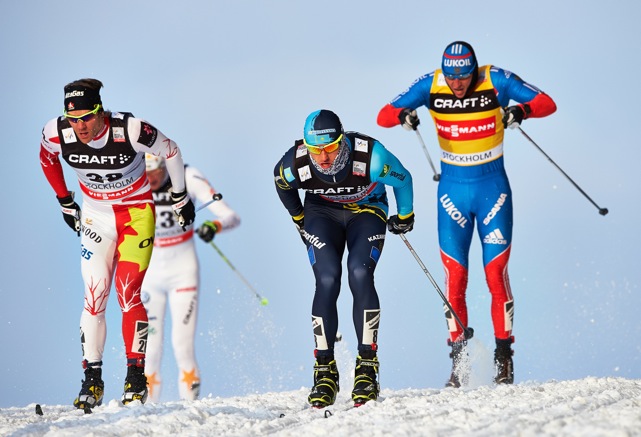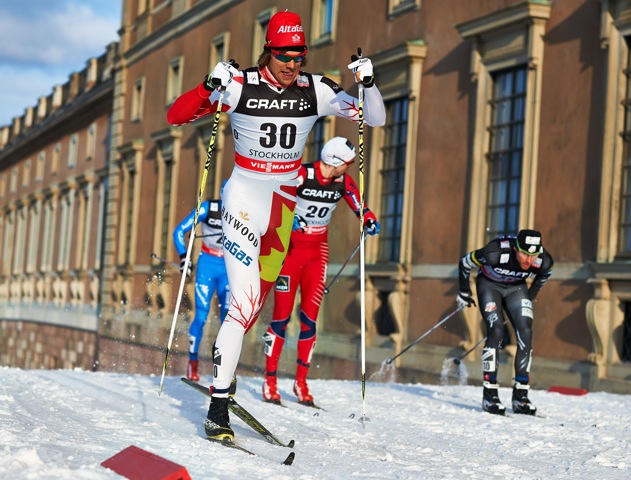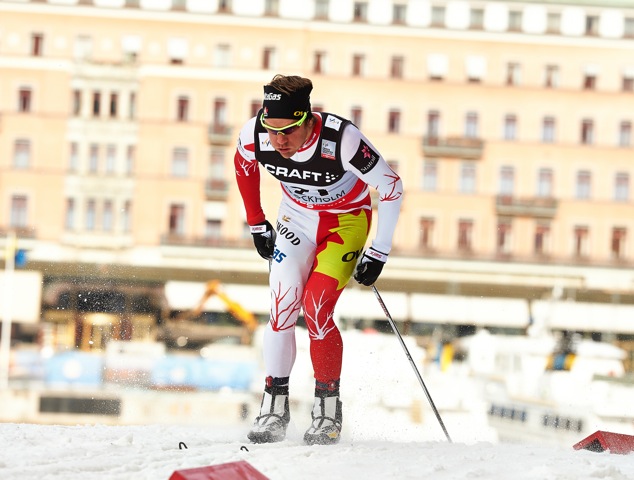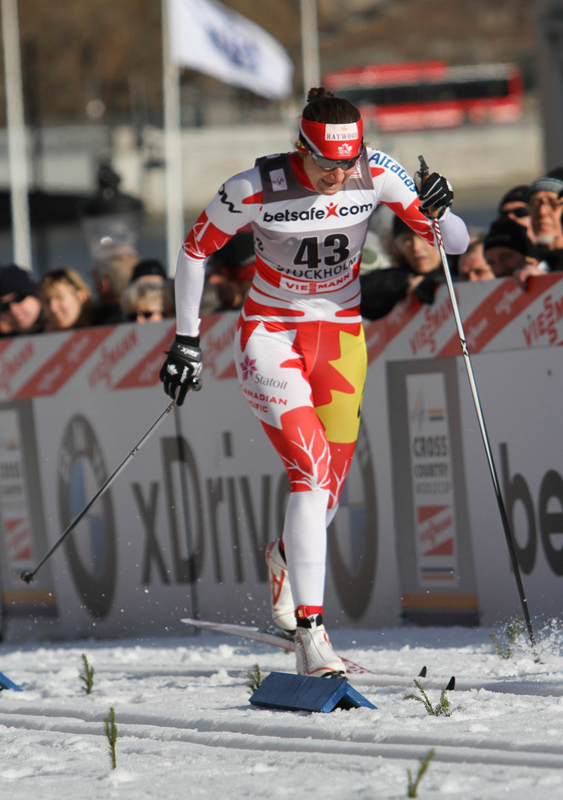
For every Canadian qualifier except Dasha Gaiazova, the quarterfinals of Wednesday’s 1.1-kilometer classic sprint — the first race of the 2013 World Cup Finals — were a second chance, an opportunity to get it right.
Gaiazova, 29, had qualified in a career-best fourth, 2.24 seconds behind Finnish winner Anne Kyllönen (who clocked 2:45.63) at the last city sprint of the season in Stockholm. It was a great feeling, and Gaiazova carried the momentum into her heat to end up 16th overall.
Meanwhile, Canadian World Cup teammates Devon Kershaw and Lenny Valjas were scrambling for an edge – something that would make them faster than their 28th– and 30th-place qualifier finishes. Double poling the relatively flat 1.1 k course on skate skis, Kershaw made it through in 28th, 7.88 seconds off Norwegian Eldar Rønning’s top qualifying time of 2:21.52. Valjas opted to stride and tied Marcus Hellner for 30th (+9.63), advancing with a better sprint ranking.

“It was pretty close,” Valjas recalled.
But there wasn’t much he could do. A lean 6-foot-6, Valjas knew his strengths weren’t in double poling – even if everyone else was doing it. He tried it warming up, but could tell by the first climb grinding it out wasn’t going to work.
“I don’t know if I was too heavy, my poles were sinking in, and it just didn’t feel good,” Valjas said. “For now, I’m not strong enough to double pole this course.”
The 24-year-old went with the one option he had and stuck with the classic skis. He kicked off the first men’s quarterfinal of the afternoon in strong form, taking charge up the first hill against the likes of Norway’s Tomas Northug, American Andy Newell and Rønning.
Up and over, Valjas continued to stride while everyone else double poled into the descent. Valjas held his own on the downhill, moving to third on the first technical corner, and strided alongside Northug to lead the following incline.
But classic skis could only take him so far, and Valjas dropped toward the back on the final straightaway rise to the finish. Northug stayed in front, Newell surged past Valjas, and Rønning got back in the mix ahead of him. Valjas finished fourth, 1.73 seconds behind Northug in first.
“I was hoping to be different and hoping it would work out, but this time it didn’t,” Valjas said . “But that was my only choice.”
He did not advance and ended up 20th, good enough for eighth place in the overall sprint rankings, which were finalized Wednesday. Last year, Valjas was 12th in the Sprint Cup.
With 10 days left until he’s surfing somewhere tropical, Valjas remained positive about his result.
“I’m not too upset, it’s just the conditions didn’t suit me at all today,” he said.

Kershaw faced a similar dilemma in the fifth quarterfinal. He recalled being up against the likes of this year’s World Cup sprint champion, Emil Jönsson of Sweden, Norway’s Eirik Brandsdal, and Alexey Poltoranin of Kazakhstan, and two distance skiers: Sweden’s Daniel Richardsson and then-overall World Cup leader Alexander Legkov of Russia (who was ultimately bumped to second by Stockholm sprint winner Petter Northug).
Unsure whether the others would go for all-glide again, like most of the top men did in the qualifier, Kershaw focused on himself. He had narrowly qualified on skate skis so why not switch to classic? He had a feeling Brandsdal, Jönsson and Poltoranin would double pole, but wasn’t so sure about Richardsson and Legkov. When he saw everyone but him line up on freestyle boards, Kershaw was a bit surprised.
“But I don’t regret making that choice,” Kershaw said. “I double poled in Drammen and ran out of gas hard in the last 100 meters and consequently ended up a very disappointing 49th so I was happy to make the heats, but I barely made it.”
Kershaw used his second chance and good feelings from Saturday’s Holmenkollen 50 k – where he was 29th on a tough waxing day – as fuel, rising to fourth at the top of the first hill in the quarterfinal.
He maintained his good positioning on the final downhill and into the headwind on the following straightaway. By the next descent, however, Kershaw said he didn’t have much of a chance. With significantly less glide, he dropped behind on the gradual downhill before the final corner into the stadium. He needed to be in contact, Kershaw said, and was left running from the back toward the finish.
He picked off two places, passing Richardsson and Legkov to end up fourth, 1.79 seconds behind Brandsdal in first.
“I was surprised at how fast the hill ended,” Kershaw recalled. “I’m like, ‘Oh, I’m making up ground, I’m making up ground, I might be able to catch third.’ Second might have been a stretch, but I was coming back on [Poltoranin in third] quite a bit.
“All of a sudden, it flattened out a bit and I was at the finish line,” he added. “I’m like, ‘No! I’m not even tired and it’s over.’ ”
Kershaw ended up 18th, his best result since placing eighth in mid-February at a World Cup classic sprint in Davos, Switzerland. While it was a good sign, the 30-year-old veteran and 2011/2012 overall World Cup runner-up thought it was a little too late.
“I have three more races in my season,” Kershaw said. “I’m super motivated, I still want to ski race to the best of my abilities, but I’d be lying if I said I wasn’t already going through what I did wrong this year.

“I’m a far cry from second in the overall and second in the distance cup this year,” he added. “Two years ago, [Alex Harvey and I] were world champions and I was eighth in the overall. This year was the worst I’ve had in a long time. I feel OK for this weekend, but it doesn’t matter how good this weekend goes, this season was a disaster so I’ve got to go back to the drawing board.”
Gaiazova, who was ultimately 16th after placing fourth in her quarterfinal, had a few thoughts about what she could’ve done differently. She started off in front with Finland’s Mona-Liisa Malvalehto and Russia’s Elena Soboleva, and stayed there when Marit Bjørgen charged up another lane toward the finish. Malvalehto snuck inside and ahead on the last corner, passing them both and skiing away to win the heat, 0.43 seconds over Bjørgen. Maiken Caspersen Falla of Norway was third, 0.99 seconds back, and Gaiazova finished fourth (+3.02).
“If I could do it over again I would have attacked from the front and tried to break away,” Gaiazova told Cross Country Canada. “The body felt amazing. My skis were fast, but I went light on the kick wax.”
That turned out to be a problem.
“I had no kick for the uphill, but we thought I’d be much faster in the double poling section,” she added. “The other girls just had more kick and were stronger than me up the hill. I am happy, but want to come back here next year and get on the podium.”
Just outside the top 30, Alex Harvey missed qualifying by 0.23 seconds. He was 32nd, 9.86 seconds back from Rønning.
“I’m feeling good about the effort, just super frustrated about some pole issues I had 10 sec before the start!” Harvey wrote. “That’s when I realized that the basket on my right pole was on backwards.”
Fortunately, Canadian head coach Justin Wadsworth was nearby and gave him a spare. Unfortunately, it wasn’t the right size and had a “pretty basic” unadjusted strap.
Double poling on skate skis, Harvey felt strong up the first climb, but the pole became a factor in the more gradual sections.
“I felt like I lost time on the high speed section because of the pole thing,” he wrote. “The track was in really poor conditions. It just never really settled … loose, cold, dry snow. Testing kick wax we could barely make it up the first hill. Guys on classic skis couldn’t really use it as an advantage up the hills today.”
If you ask him, Wednesday’s sprint – which included high winds that blew out the tracks – “100%” depended on conditions, and they weren’t necessarily fun.
For Michael Somppi of the Alberta World Cup Academy (AWCA), who earned World Cup Finals starts as the NorAm leader, the experience of his first World Cup city sprint was what he’d remember. Somppi finished 48th in the qualifier after double poling on skate skis as well.
“The conditions were slow, but the first big climb on the course was so broken down that it was difficult to kick classic skis up it,” he wrote. “Although my result wasn’t anything amazing, I finally felt good pushing my body today. I think that’s a good sign leading into the prologue and distance races.”
World Cup Finals continue with freestyle prologues on Friday, 10/15 k classic mass starts on Saturday, and 10/15 k freestyle pursuits on Sunday.
“My goal is simply to have a race I am satisfied with in terms of how I felt,” Somppi added. “I still don’t feel I have had any really good performances in World Cup races to date and I hope to change that this weekend.”
The women’s NorAm leader, Emily Nishikawa (AWCA) finished 47th, and Canadian World Cup distance specialist Ivan Babikov placed 50th.
Alex Kochon
Alex Kochon (alexkochon@gmail.com) is a former FasterSkier editor and roving reporter who never really lost touch with the nordic scene. A freelance writer, editor, and outdoor-loving mom of two, she lives in northeastern New York and enjoys adventuring in the Adirondacks. She shares her passion for sports and recreation as the co-founder of "Ride On! Mountain Bike Trail Guide" and a sales and content contributor at Curated.com. When she's not skiing or chasing her kids around, Alex assists authors as a production and marketing coordinator for iPub Global Connection.



